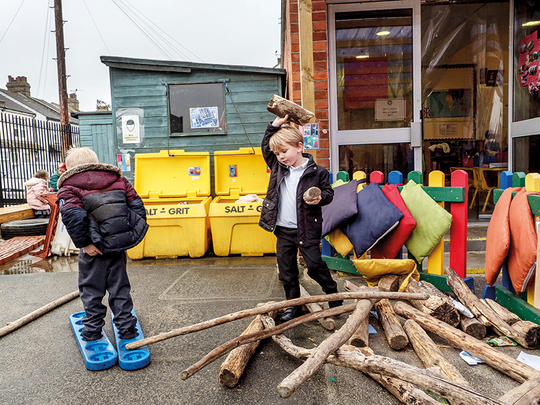
Article 31 of the United Nations Convention of the Rights of the Child states that all children have a right to play, this includes all children whether they are at home or in hospital.
Playtime is a period of time during the day when children are allowed and encouraged to play, alone or with friends, in what is usually unstructured games or activities. Even if parents or teachers or caretakers don't set a structure, children always find a way to play according to experts in the UAE and researchers abroad.
Why have this conversation now?
According to research conducted across different countries, playtime for children has drastically reduced over the past half-century. In schools, the increased focus on academic syllabi and grades, playtime has been substituted with more classes. At home, with mostly both parents working, play time has become a thing to do on the weekends - if that. Technology is also a culprit here with most young children preferring online games or watching videos to playing alone or with others in constructive games.
We spoke to doctors at the Great Ormond Street Hospital for Children in London who employ therapeutic play mechanisms for their young patients.
These 'play specialists' emphasise the importance of playing in children's development, stress levels and adult behaviour when they grow up. Here's what they had to say:
What the importance of a parent’s role in ensuring that children get enough play time?
Positive relationships
Play is one of the most important things in a child’s life and parents play a crucial role. Nurseries and schools will use play as it is part of the curriculum, but for parents; joining in with the play will build positive relationships and create an environment of fun.
Ideally, how many hours daily should children be allowed and encouraged to play?
At least 90 minutes a day
As Play Specialists, we believe that children should always have access to play resources and should always be encouraged to take part in play activities.
Children instinctively play so even when there is no set activity; children will always find a way to play. It is through play that children learn, problem solve, develop social skills and gain confidence. It has such a positive impact that we personally feel there needn’t be a set limit.
Ideally, 30 minutes of adult led activities and 60 minutes of unstructured play should be encouraged on a daily basis. However, this is just a guideline and timings should vary depending on the child’s interest and ability.
Are there age criteria on what you do – how is ‘play time’ different for an older child?
Solitary play and co-operative play
It is important to remember that there are stages that children transition through during their lives and this includes the stages of play.
Children’s play changes as they grow and, therefore, play time is different for a younger child and an older child. For example, one of the stages of play is solitary play which is typically seen in children aged 2-3 years old. During this stage, children will play alone and will be uninterested or unaware of what others are doing.
You then compare that with co-operative play stage when play finally becomes organized into groups and teamwork is seen. Children are now interested in both the people that they are playing with as well as the activity at hand. This happens between the ages of 5-6 years old and the skills learnt will be taken forward as they get older.
Why is play important for children who might be in hospital or at home with a long-term illness?
Normality and solace
For some patients who are isolated and far from home, play can be a real time of normality and solace from hospital life. It is something fun and enjoyable that translates to each patient, no matter what the language or cultural differences may be. Having time for arts and crafts, games, fun and interaction can be really uplifting for a patient’s wellbeing and help patients cope with their diagnosis and treatment.
How does therapeutic play help children visiting the hospital?
Coping mechanisms
Therapeutic play helps children when staying in hospital as it is a way for them to take some control back while they are patients. A lot of decisions are made in a hospital and therapeutic play is a way for children to discover strategies for coping with everyday problems.
As a Play Specialist, we have the responsibility to encourage children to take part in play as it will help them cope with the stressful or upsetting experience of being in hospital.
In this age of omnipresent technology, how has play time become different?
Technology has its positives and negatives in relation to how children play.
Public Health England has seen a correlation between the rise of computer games and a rise in childhood obesity, as well as numbers of children being diagnosed and medicated for attention deficit problems. By using devices such as tablets, computer games and phones, children would be in less contact with their peers, therefore will find it harder to form basic social skills.
However, when technology is balanced out with other activities such as outdoor play and paper-based activities, it can be used to enhance children’s learning as we often see children respond positively when trying out new technologies.
As a Play Specialist, one of our preparation and distraction tools is the use of the iPad and the huge range of apps available, such as the MRI app, which goes through each stage of having an MRI scan.
GOSH treats 1,500 children from the Middle East every year for rare and complex medical conditions. To find out more about GOSH, visit http://gosh.com.kw/











